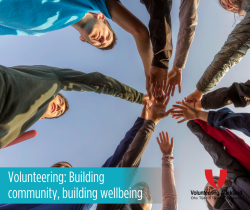Volunteering: Building Community - Building Well-Being

Volunteering is a powerful force for good in communities, offering benefits that extend far beyond the services provided. It fosters connections, builds trust, and creates a sense of belonging. For Mental Health Awareness Week in New Zealand, it’s crucial to recognise the role of volunteer well-being in fostering strong, supportive communities. The theme, “Community is … what we create together,” encapsulates the essence of volunteering: through giving time and effort, volunteers not only help others but also strengthen their own mental health and well-being.
1. The Importance of Volunteer Well-Being
Volunteers are often seen as the backbone of communities, providing essential services, support, and care. However, the well-being of volunteers themselves is just as important as the contributions they make. When volunteers feel valued, supported, and connected, they are more likely to experience positive mental health outcomes, which in turn enhances the overall health of the community.
-
Mental Health Benefits of Volunteering: Engaging in volunteer work has been shown to improve mental health by reducing feelings of loneliness, depression, and anxiety. Volunteers often report a sense of purpose and satisfaction from helping others, which can boost self-esteem and happiness. The act of volunteering can also provide a break from daily stresses, offering a sense of fulfillment and perspective.
-
Building Resilience: Volunteering helps individuals build resilience by fostering a sense of agency and control. Facing challenges and finding solutions in volunteer roles can empower individuals, building their confidence and coping skills. This resilience is vital for mental health, helping volunteers navigate personal and professional challenges more effectively.
-
Social Connections: One of the key benefits of volunteering is the opportunity to form meaningful social connections. By working together towards common goals, volunteers create bonds and friendships that provide emotional support, reduce isolation, and build a sense of community. These connections are vital for mental health, offering a network of support and belonging.
2. Creating a Supportive Environment for Volunteers
To ensure that volunteering remains a positive experience that supports mental health, organisations must prioritise the well-being of their volunteers. This involves creating a supportive environment that values and nurtures volunteers, recognising their contributions, and addressing their needs.
-
Training and Preparation: Providing comprehensive training and preparation is crucial for volunteer well-being. Volunteers should feel confident and capable in their roles, understanding their responsibilities and the impact of their work. Training also equips volunteers with the skills to handle challenging situations, reducing stress and anxiety.
-
Recognition and Appreciation: Feeling valued and appreciated is essential for volunteer well-being. Organisations should recognise the efforts of volunteers through regular feedback, thank-you notes, awards, and public acknowledgment. Celebrating volunteer achievements not only boosts morale but also reinforces the importance of their contributions.
-
Support Systems: Creating support systems for volunteers is vital for their mental health. This includes having clear communication channels, providing access to resources, and offering support from staff or peer mentors. Volunteers should feel that they have someone to turn to if they face challenges or need guidance.
-
Flexibility: Flexibility is an important factor in maintaining volunteer well-being. Volunteers often balance their roles with other commitments, such as work, family, or studies. Offering flexible volunteer opportunities, such as short-term projects, remote roles, or flexible hours, allows volunteers to contribute in ways that suit their lifestyle and needs.
3. The Role of Volunteering in Building Community
The theme of “Community is … what we create together” highlights the collective effort involved in building strong, supportive communities. Volunteers play a key role in this process, helping to create environments where everyone feels welcome, valued, and included.
-
Fostering Inclusion: Volunteering brings people from diverse backgrounds together, fostering a sense of inclusion and belonging. By working side by side, volunteers learn about different perspectives, cultures, and experiences, breaking down barriers and building understanding. Inclusive volunteering initiatives ensure that everyone, regardless of age, ability, or background, has the opportunity to contribute to and be part of the community.
-
Empowering Individuals: Volunteering empowers individuals by giving them the opportunity to make a difference. It provides a platform for people to use their skills, knowledge, and passions to contribute to causes they care about. This empowerment enhances self-worth and helps individuals feel more connected to their community.
-
Building Trust: Trust is a cornerstone of strong communities, and volunteering helps build trust among community members. By working together towards common goals, volunteers develop trust and cooperation, which strengthens social cohesion and resilience. Trust is essential for creating safe, supportive environments where people feel comfortable to share, collaborate, and grow.
-
Creating a Ripple Effect: The positive effects of volunteering extend beyond the individuals involved, creating a ripple effect throughout the community. Volunteers often inspire others to get involved, leading to a cycle of giving and support. This ripple effect can lead to stronger, more connected communities, where everyone feels they have a role to play and a place to belong.
4. Volunteering as a Pathway to Better Mental Health
For individuals seeking to improve their mental health and well-being, volunteering offers a valuable pathway. By contributing to their community, volunteers can experience the joy of helping others, the satisfaction of achieving goals, and the comfort of belonging to a supportive network.
-
Purpose and Meaning: Volunteering provides a sense of purpose and meaning, which is essential for mental health. When individuals feel that their efforts are making a difference, they are more likely to experience fulfillment and satisfaction.
-
Connection and Support: The social connections formed through volunteering offer a network of support that can help individuals navigate life's challenges. These connections provide emotional support, companionship, and a sense of belonging, all of which are crucial for mental health.
-
Growth and Learning: Volunteering offers opportunities for personal growth and learning. By taking on new roles and responsibilities, volunteers can develop skills, gain experience, and expand their horizons. This growth fosters self-confidence and resilience, helping individuals feel more capable and prepared for the future.
Conclusion: Building Community, Building Well-Being
Volunteering is a powerful tool for creating community and supporting mental health. By prioritising volunteer well-being, organisations can ensure that volunteers feel valued, supported, and connected, leading to positive outcomes for both individuals and communities. As we celebrate Mental Health Awareness Week in New Zealand, let us remember that community is indeed what we create together. Through volunteering, we can build stronger, more resilient communities where everyone feels they belong, contributing to the well-being of all.

